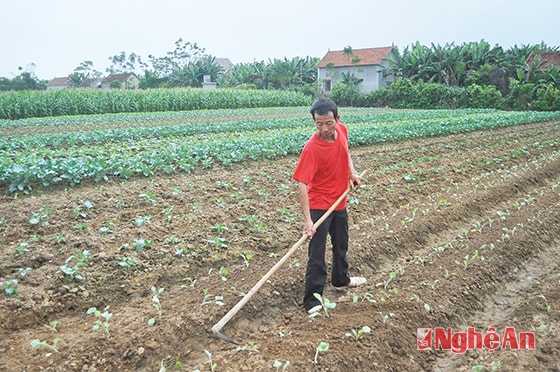"Awakening" the potential of sandy land
(Baonghean) - Mr. Hung, hamlet 10, Dien Thanh commune is a pioneer in applying technology, bringing new crops to the fields, creating high economic value per unit of cultivation. With less than 1 acre of land (0.5 ha), Mr. Hung earns nearly 400 million VND per year. This is a miracle because the sandy land of the commune is inherently infertile and acidic...
(Baonghean) - Mr. Hung, hamlet 10, Dien Thanh commune is a pioneer in applying technology, bringing new crops to the fields, creating high economic value per unit of cultivation. With less than 1 acre of land (0.5 ha), Mr. Hung earns nearly 400 million VND per year. This is a miracle because the sandy land of the commune is inherently infertile and acidic...
Having traveled to many places, Mr. Tran Duy Hung realized that his hometown had potential land and people had labor, but why was the land abandoned? A few years ago, he asked the question, but he had to find the answer when he found Quynh Luong commune, which is also a sandy land but has a famous vegetable growing movement to learn from. At first, he bought kohlrabi and cabbage to plant. Working and learning at the same time, the first time was very difficult, because the land was sandy, so every time it flooded, it failed. However, thanks to the help of friends and his diligence in learning and drawing on experience, the damage gradually decreased. Since 1996, in addition to kohlrabi and cabbage, Mr. Hung boldly added some new crops such as tomatoes, scallions, cauliflower, etc.
 |
| Mr. Tran Duy Hung takes care of the vegetable field. |
After mastering the technique of growing vegetables, Mr. Hung moved up to the next level, which is producing and cultivating vegetable seeds. This is a turning point because besides creating more jobs, it also brings economic benefits to the family. In addition to producing vegetables and supplying seeds to people in the region, with prestige and dedication, the family also supplies vegetable seeds to some other districts. Currently, on an area of about 5-6 sao of land, he never runs out of products to sell... With a passion for work and constant creativity, after a period of research, in 2005 he started to introduce watermelon varieties into summer crop production. After 2 difficult years of production, in 2008 he was successful. This is a breakthrough because it not only discovered another crop suitable for sandy soil but also brought high economic efficiency. With 2 watermelon crops each year, he earns hundreds of millions of dong, opening up a new direction of intensive farming for people in the region. Since then, the people of Hamlet 10 have not only produced two crops a year like before, but have produced four crops. According to Mr. Hung, producing short-term crops takes a lot of effort but reduces the risk of damage due to weather and pests; the longer the crop cycle, the greater the risk of damage due to natural disasters and pests.
Not only is he a pioneer in opening up production and increasing income, Mr. Hung is also willing to guide the villagers to do the same. As the leader of the cooperative's production team, he suggested that the village and the cooperative's Board of Directors form groups of 3-5 households to help each other with the farming. The groups set up camps in the fields to rest, protect the fields, and supervise and encourage each other to produce clean, safe vegetables to create prestige and build a long-lasting brand...
From a strip of acidic, alum-rich sandy land, even abandoned in some places, up to now the whole hamlet has over 100 households participating in growing vegetables on an area of 15 hectares. To find a sustainable outlet for vegetables, with the help of the commune and support of some people, Mr. Hung stood up as the group leader and with other families chose 10 hectares to produce according to VietGAP process. After a period of monitoring, checking and sampling, in 2013, the 10-hectare vegetable field of hamlet 10, Dien Thanh commune was recognized by the authorities as meeting VietGAP standards... From here, the vegetables produced by the people are conveniently purchased by agents at the field's edge for sale...
On a plot of land less than 1 acre, each year Mr. Hung has a "net profit" of about 200 million VND, but he also explained: "Although the above income level is quite good for the countryside, the family is spending a lot so it is not well off. Currently, in addition to ensuring spending for 8 people, raising 4 children to study, of which 2 are studying at universities in Hai Phong and Hanoi...". Almost all day "selling face to the ground, selling back to the sky", Mr. Hung always tells himself that he and his wife must try hard and save money to raise their children to study. His biggest wish is that his children work hard and study well, can help their parents as well as households apply scientific and technical advances to increase the value of crops...
Saying goodbye to us, Mr. Hung shared a sharing and also a burning concern: “Dien Thanh is a suburban commune in the process of urbanization. In the long term, production land will gradually shrink, so we must focus on investing to improve land use efficiency”. Hopefully, this concern will be shared by the local Party Committee and government so that they can promptly have orientations and plans to improve the efficiency of land use in the area; at the same time, there will be plans for training and career conversion so that people can get rich right on their homeland.
Article and photos:Nguyen Hai






